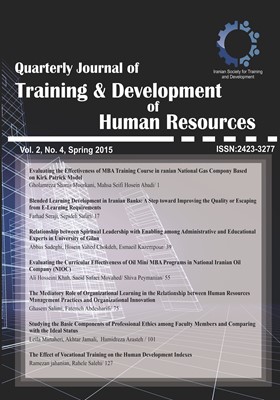Evaluating the Curricular Effectiveness of Oil Mini MBA Programs in National Iranian Oil Company (NIOC)
Subject Areas :
1 -
Keywords: Curriculum Effectiveness Evaluation Oil Mini MBA National Iranian Oil Company Kirk Patrick’s Model,
Abstract :
This research aims to evaluate the effectiveness of MBA programs that were held in National Iranian Oil Company from 1392 to 1393. In order to achieve the aim, first three levels of the Kirk Patrick’s Model (Reaction, Learning, and Behavior) have been selected as the evaluation basis of this study. The mixed method approach with triangulation research design has been used; this design consisted of two simultaneous processes, described here as collecting qualitative and quantitative data at the same time by use of different research tools. Research Participants were 30 high-ranked managers of NIOC who attended in oil mini MBA Programs. Research data gathered by different tools: quantitative data was derived from three questionnaires of Attitude Scale, Learning Self-evaluation, and Behavior Rating Scale; qualitative data was gained through a protocol which designed for doing semi-structured interviews. The collected data have been analyzed through quantitative/qualitative methods: Quantitative data has been examined by Effectiveness Rate and Pearson’s Correlation Coefficient; and qualitative information has been explored and interpreted through the procedure of Thematic Analysis. It is worth noting that the results validation has been done by Peer Review Audit (member checking). The overall findings show that the MBA programs of NIOC were not been effective and successful: effectiveness rate of level 1 (Reaction) is below desired point; for level 2 (Learning) it is a little above the desired point; and in level 3 (Behavior), like level 2, is below desired point. We definitely conclude that the MBA programs have not been successfully adapted to company context and needs, so not been accepted among top-level managers for whom the courses been developed. Therefore, transformation of learning (level 2) to behavior (level 3) was not occurred. It is also true that the participants’ dissatisfaction (level 1) with curricular aspects of programs led to insignificant learning.


